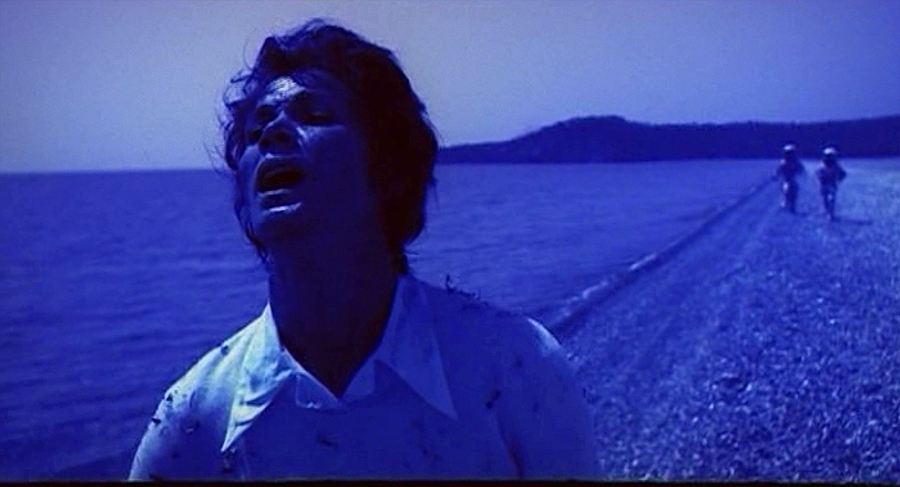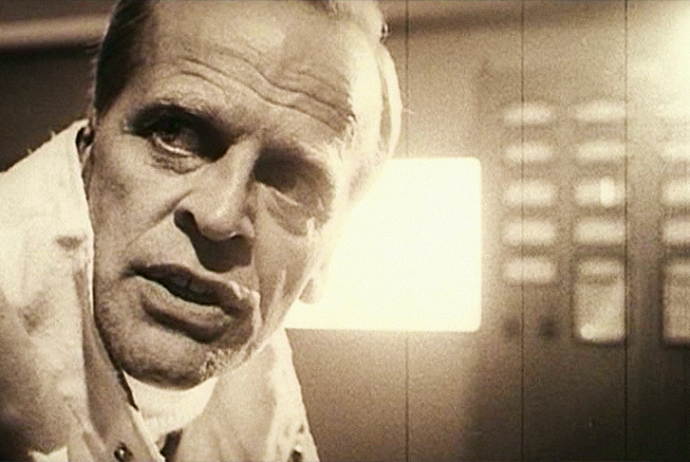This is the kind of film which could easily provoke riots at the cinema with its ending, a cheap-shot caption which ranks up there with “…and it was all a dream,” in terms of absolute laziness on the part of writer Luigi Bazzoni. I can only presume the novel on which it was based, Las Huellas by Mario Fenelli (who also worked on the screenplay), was a good deal more rigorous in terms of its storytelling. It’s a shame, as up until the movie’s abject failure to provide anything approaching a suitable resolution, there is much to admire. It looks, thanks to triple-Oscar winning cinematographer Vittorio Storaro, very nice, and Nicola Piovani’s score is also highly effective. Bolkan delivers an effective performance as heroine Alice Cespi, who is initially plagued by dreams of an astronaut being deliberately left behind on the moon, apparently as part of some experiment, run from mission control by Blackmann (Kinski). That turns out to be the tip of the mental iceberg, because when Alice turns up to her job as a translator, the boss berates her for missing days of work, and Alice is shocked to realize a whole chunk of time has apparently gone missing from her life.
Back in her apartment, she discovers a clue, in the form of a ripped-up postcard from the ‘Garma Hotel’, and on a hunch, she travels to the Turkish seaside resort [in reality, it was filmed in Kemer]. There, she meets a little girl, Paula (Elmi), who seems to recognize her – but as a woman with red hair, called “Nicole”. And she is not the only person who appears to remember Alice/Nicole from a previous visit to the town, for one reason or another, a boutique owner and an old lady on the beach also having interacted with her. She is befriended by a visitor, Henry (McEnery), but the more Alice pries out of Paula about her alter-ego Nicole, and what she told the child, the more suspicious she grows about Henry’s motives. Alice also becomes increasingly concerned that persons or a group – perhaps connected to ‘Blackmann’ in some way – are after her, though the reasons for this remain obscure. Did she discover something in connection with her work, perhaps when she was translating at an astronautics conference? Meanwhile, the dreams continue, and do they hold a key clue? Or is she just remembering scenes from a film she saw?
 It’s the kind of paranoid, psychological thriller that is a great deal easier to set up than to resolve, and it’s clear that Bazzoni has absolutely no interest in the resolution. Which, I’d probably have been a great deal more okay with, if I had known going in, that there would be only a token effort to tie the threads together – which is so wretched, I wish they hadn’t bothered – I could just have appreciated the atmosphere, which is certainly present in spades. But I’ve always been a believer that cinema should be a story-telling medium, first and foremost; if there are other aspects present, that’s fine, as long as they are built on an adequately-strong foundation of content. Otherwise, you might as well just be in an art gallery, looking at pretty pictures. In multiple places online, I saw this movie described as a giallo, that most Italian of mystery genres; but apart from its total disregard for logic, it lacks the horror and erotic elements which tend to characterize the other entries in the field (though that may be as much my own interests leading me towards that side!).
It’s the kind of paranoid, psychological thriller that is a great deal easier to set up than to resolve, and it’s clear that Bazzoni has absolutely no interest in the resolution. Which, I’d probably have been a great deal more okay with, if I had known going in, that there would be only a token effort to tie the threads together – which is so wretched, I wish they hadn’t bothered – I could just have appreciated the atmosphere, which is certainly present in spades. But I’ve always been a believer that cinema should be a story-telling medium, first and foremost; if there are other aspects present, that’s fine, as long as they are built on an adequately-strong foundation of content. Otherwise, you might as well just be in an art gallery, looking at pretty pictures. In multiple places online, I saw this movie described as a giallo, that most Italian of mystery genres; but apart from its total disregard for logic, it lacks the horror and erotic elements which tend to characterize the other entries in the field (though that may be as much my own interests leading me towards that side!).
Kinski’s role is little more than an extended cameo, and I doubt it took much more than a couple of days to film his segments. Indeed, just as in Deadly Sanctuary, it appear that his character has absolutely no direct interaction with anyone else in the movie, since he’s communicating with the astronauts over the radio from a (sparsely populated!) ground control center. Perhaps this is a way directors found to avoid issues? Effectively, keep him in solitary confinement? I’ll have to keep an eye out for this in other Kinski-cameos. It’s a very slight piece, not helped by Kinski apparently being dubbed into Italian, though he does manage to deliver his usual disturbing degree of intensity. If he’d been on the ground in Houston for Apollo 13, he could probably have brought the module home by sheer force of will. However, it certainly counts as a film watched in spite, rather than because, of the Kinski content. And yet, despite the qualms expressed above, I don’t feel like it was 90 minutes entirely wasted. The technical aspects and the lead performance were enough to merit appreciation. It’s just a shame they weren’t in the service of a better script.
Dir: Luigi Bazzoni
Star: Florinda Bolkan, Peter McEnery, Nicoletta Elmi, Klaus Kinski
a.k.a. Primal Impulse, Footprints on the Moon
